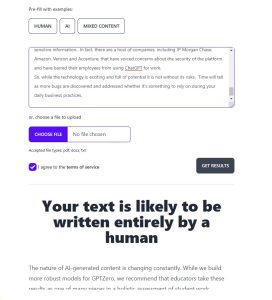
![]()
We recently posted some of UniVista’s concerns regarding ChatGPT, however it has come to our attention that some may not be very familiar with the technology, nor its benefits and especially some of its risks. To help clarify things a bit more, here is a basic rundown of what it is, what it does and where and why you need to tread carefully with the technology.
ChatGPT is an Artificial Intelligence (AI) chatbot developed by OpenAI, which was released in November 2022. ChatGPT (Chat Generative Pre-trained Transformer) is an app (available free for its basic version and via a monthly subscription for an enhanced version) that can assist users with writing tasks by suggesting ideas, helping create outlines and even suggesting dialogue. Initially, ChatGPT’s AI language model was trained using a large body of text from numerous sources including Wikipedia, books, news articles, scientific journals, etc. However, that was only the start of its education. The more the platform is used, the more it will “know” and some of that knowledge will come directly from users like you.
The ChatGPT app can be useful when used to help with writing tasks like blogs, reports and can even assist with writing correspondence like emails and texts. However, as we pointed out in our previous blog and communication from our president (link to blog here), though the technology is exciting there are still many bugs in the platform, in addition to many security risks. Because, as we mentioned above, ChatGPT is a system that incorporates and absorbs user-fed information into its data, inadvertent sharing of confidential information may occur. Even under the most innocent of circumstances such sharing would be in violation of privacy agreements you may have in place.
Something to keep in mind is that ChatGPT isn’t perfect, it only “knows” what it has been taught. And, unfortunately sometimes what it has been taught may be wrong, or incorrectly interpreted, and may give you incorrect information or suggestions. Another issue to be aware of is that the platform does collect user information including your IP address, your browser type and settings, along with data regarding your interactions on the site, which includes the type of content, features and actions you are engaging with. Additionally, ChatGPT saves your chat history, which goes back to our warning about inadvertently sharing sensitive information. In fact, there are a host of companies, including JP Morgan Chase, Amazon, Verizon and Accenture, that have voiced concerns about the security of the platform and have barred their employees from using ChatGPT for work.
So, while the technology is exciting and full of potential it is not without its risks. Time will tell as more bugs are discovered and addressed whether it’s something to rely on during your daily business practices.
AFTERTHOUGHTS:
As a final note – it seems that the old adage that “every action has an equal and opposite reaction”, is true. To help determine whether a body of text has been written via AI vs a human, a few new “AI detectors” have recently hit the market. Essentially these Written AI detectors use various means to determine if something is human-written or if AI wrote the piece.
As one would expect, the written AI phenomena has caused an issue in academics, and it became important to ascertain whether a student actually wrote the essay or term paper they turned in. To that end a young (22 years old) Princeton Student, Edward Tian, developed GPTZero (GPTZero). GPTZero has a 98% accurate detection rate, and as an exercise we ran this human-written article through their platform and was given this result:

